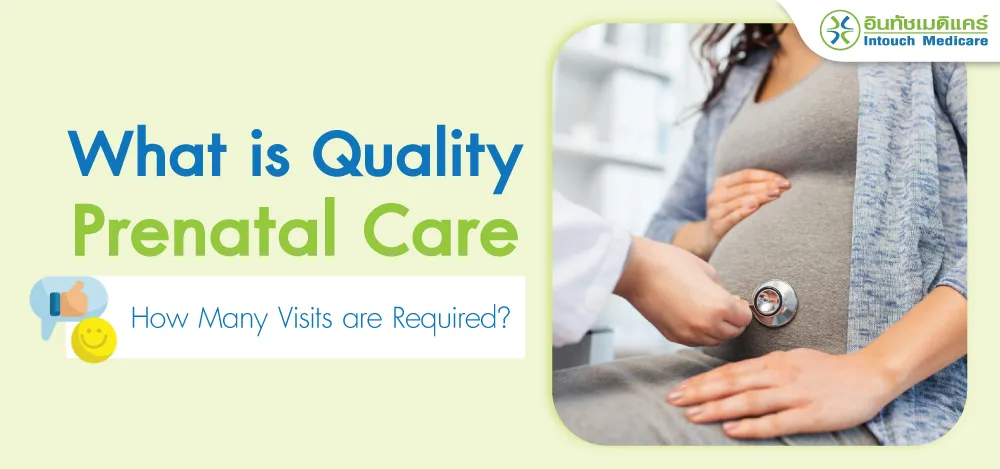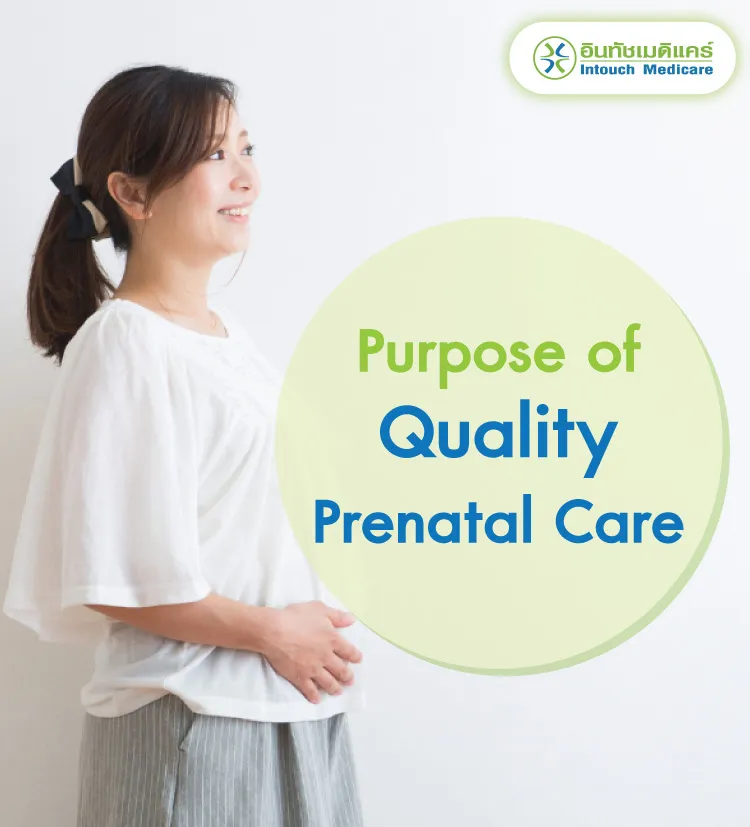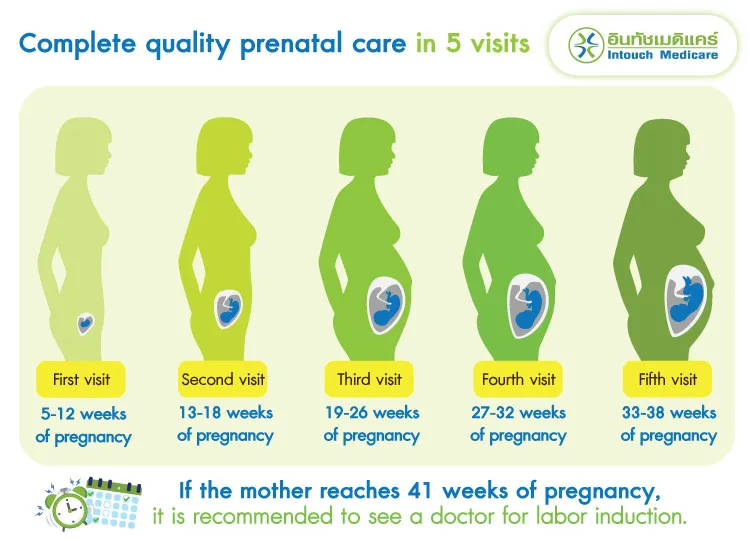What is Quality Prenatal Care and How Many Visits are Required?

Quality prenatal care is essential for expectant mothers to ensure a smooth pregnancy and to minimize risks to both the mother and the unborn child. Receiving quality prenatal care at an obstetrics clinic helps monitor the development of the pregnancy at each stage and allows for necessary adjustments. Let's explore what quality prenatal care entails and the appropriate timing for it.
Understanding Quality Prenatal Care
What is Quality Prenatal Care?
Quality prenatal care refers to the initial prenatal visit before 12 weeks of pregnancy and at least five prenatal visits throughout the pregnancy at a Obstetrics Clinic. This ensures that the mother and baby receive the most comprehensive and optimal healthcare services during the pregnancy, which also has long-lasting effects post-delivery.

Purpose of Quality Prenatal Care
Maintain Health and Well-being: To ensure the physical and mental well-being of the mother and the fetus.
Monitor Growth and Development: To regularly check the growth and development of the fetus.
Early Detection and Prevention: To diagnose, prevent, and treat any abnormalities or complications that may arise during pregnancy from the earliest stages.
Prepare the Mother: To prepare the mother for the pregnancy, childbirth, postpartum period, and child-rearing.
Reduce Stillbirth and Neonatal Death: To decrease the rate of stillbirths and early neonatal deaths.
Reduce Maternal Mortality and Complications: To lower the rate of maternal mortality and complications from childbirth, including abnormal deliveries, infections, hemorrhage, and obstetric procedures.
How Many Visits are Required for Quality Prenatal Care?
Typically, a pregnant woman should have at least five quality prenatal care visits throughout the pregnancy, as follows:

First Prenatal Visit: Before 12 Weeks of Pregnancy
The first prenatal visit is a very crucial stage. Initially, it is important to check if the pregnancy is normal, determine the location of the pregnancy, confirm the presence of an embryo, review any medications the mother is currently taking, and identify any conditions or chronic diseases that require monitoring. Since this period involves the early development of the embryo and the formation of vital organs, it is essential to provide additional vitamins or folic acid supplements to support proper development in the appropriate amounts.
|
Care and Recommendations: Administer the first tetanus vaccine (dT or TT) after 12 weeks of pregnancy.Provide guidance on potential complications, such as nausea and vomiting, vaginal bleeding, frequent or painful urination.Advise that if any abnormal symptoms occur, the mother should visit the Obstetrics Clinic to consult a doctor.

Second Prenatal Visit: At 18 Weeks of Pregnancy
At this stage, the embryo begins to develop into a fetus. It is crucial to monitor the formation of organs, development, size, and weight. Regular prenatal visits and adhering to the doctor’s appointments help the mother detect any abnormalities that may occur during pregnancy early.
Care and Recommendations : Administer the second tetanus vaccine (dT or TT), at least one month after the first dose.Provide guidance on diet, exercise, rest, monitoring fetal movements, and potential complications that may arise.
Third Prenatal Visit: At 26 Weeks of Pregnancy
During this quality prenatal visit, it is crucial to monitor the fetus's growth, including the formation of organs, development, size, and weight.
Care and Recommendations : In this trimester, if there are any risks, the doctor will have the mother undergo a glucose test to check for diabetes.Provide guidance on potential complications, such as miscarriage and preterm labor.

Fourth Prenatal Visit: At 32 Weeks of Pregnancy
During this stage, it is important to monitor the fetus's growth to ensure it is progressing as expected. After 36 weeks of pregnancy, the doctor will schedule more frequent appointments, possibly once a week.
Care and Recommendations : Provide guidance on labor, family planning, and potential symptoms such as vaginal bleeding, painful urination, decreased fetal movements, blurred vision, and preterm labor pain.
Fifth Prenatal Visit: At 38 Weeks of Pregnancy
This stage focuses on monitoring for childbirth. It is necessary to check the placenta, amniotic fluid, and the baby’s head position to allow the doctor to plan for a suitable delivery.
Care and Recommendations : Advise on critical symptoms that require immediate medical attention or hospital visit for delivery, such as true labor pain, water breaking or bloody show, vaginal bleeding, decreased fetal movements, blurred vision, fever, and severe pain under the right rib.

Benefits of First Trimester Antenatal Care (Before 12 Weeks)
Initiating antenatal care before 12 weeks or within the first 3 months helps reduce the risk of abnormalities during pregnancy. The first 12 weeks are crucial as this is when the baby's organs begin to form, starting around week 3 when the baby is about 8 weeks old. By the end of the first trimester, the baby's organs are nearly complete, with the brain developing up to 50%.
Early and quality antenatal care facilitates the early detection of risks and reduces complications for both the mother and the baby. This ensures the baby's healthy development and the mother's well-being throughout pregnancy and postpartum.

Benefits of comprehensive antenatal care with all 5 visits include reducing the risk of complications during pregnancy for both the mother and the baby. It also enables healthcare providers to accurately monitor the baby's growth and the mother's physical health throughout pregnancy.
References
Manual/Guidelines for Quality Antenatal Care Service Practice in Bangkok, National Health Security Office, 2015.
Associate Professor Dr. Malival Visasakonsri, Nursing Care during Pregnancy and Childbirth, Saint Louis College Textbook Project, 2022.
Interesting Articles
Obstetrics Clinic, Specialist Obstetrician Pregnancy Care Clinic.
How to Take Care of Yourself During Early Pregnancy or Upon Realizing Pregnancy: What Should You Do?
Questions to Clarify: What Should be Checked During Each Pregnancy Visit?
For more info and make appointment
Hot Line 081-562-7722
Compiled by Intouchmedicare Clinic
Last updated: 05/07/2024
Permission is granted to use the images without seeking further authorization, exclusively for educational or informational purposes. Please provide credit or cite the source as intouchmedicare.com
